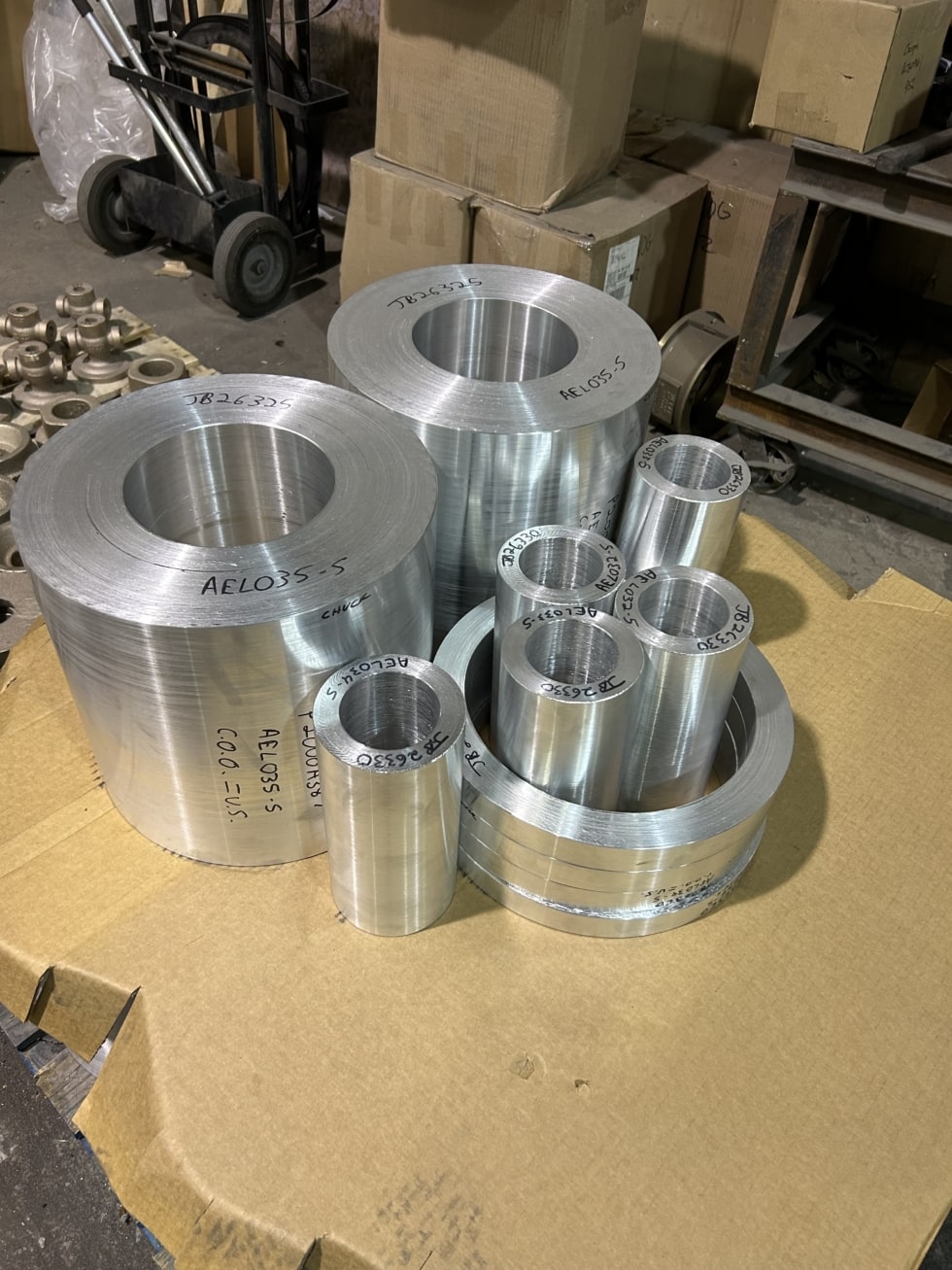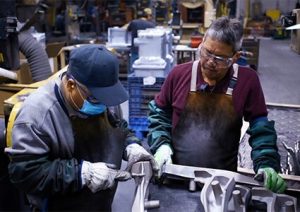Aluminum Foundry Wisconsin is known for excellence in casting
Wiki Article
Discovering the Vital Role of Light Weight Aluminum Foundry in Modern Production Processes
Light weight aluminum shops serve a pivotal function in modern production. They convert raw light weight aluminum into essential parts across numerous industries. This conversion procedure is noted by advanced spreading methods that improve efficiency. Furthermore, the shops are significantly adopting lasting methods, reflecting a change in the direction of environmentally liable production. Recognizing their duty discloses not simply their influence on production yet likewise the wider effects for advancement and sustainability in the sector. What exists ahead for light weight aluminum factories in this developing landscape?The Value of Aluminum in Modern Production
Aluminum plays a crucial role in modern manufacturing because of its unique homes. This light-weight metal is understood for its exceptional strength-to-weight ratio, making it an optimal selection for various applications. Its deterioration resistance improves longevity, minimizing upkeep costs and raising item long life. The malleability and ductility of aluminum enable intricate shapes and complex designs, which are necessary in markets ranging from vehicle to aerospace. In addition, light weight aluminum's electrical and thermal conductivity makes it appropriate for electrical elements and warmth exchangers. The recyclability of aluminum significantly adds to sustainable production techniques, as it can be reused without loss of top quality. This adaptability not only supports development but also aids satisfy the expanding demand for environmentally friendly services. On the whole, aluminum's distinct qualities setting it as a fundamental material in modern production, driving improvements and performance throughout multiple industries.Introduction of the Light Weight Aluminum Casting Process
The light weight aluminum spreading process is a vital approach for forming this versatile metal into complicated forms fit for a wide variety of applications. This procedure normally starts with melting aluminum ingots in a heating system, where temperature levels can surpass 1,200 levels Fahrenheit. Once the aluminum reaches a liquified state, it is put into a mold created to develop the desired form.There are various casting techniques employed, consisting of sand spreading, pass away casting, and financial investment spreading, each offering one-of-a-kind advantages for different applications. After the aluminum cools and solidifies, the mold is gotten rid of, exposing the cast component, which may call for more finishing procedures such as machining or surface treatment to achieve the required specs.
Quality control is necessary throughout the spreading procedure, making certain that the final items meet industry standards for toughness, toughness, and dimensional precision. This meticulous approach highlights the relevance of light weight aluminum spreading in contemporary manufacturing.
Secret Advantages of Aluminum Foundries
Light weight aluminum factories offer a number of key advantages that improve contemporary production processes. The light-weight nature of light weight aluminum adds to substantial weight savings in different applications, while cost-efficient manufacturing options make it an attractive selection for producers. In addition, the functional design capabilities of aluminum enable ingenious and complicated product growth, conference varied industry needs.Lightweight Material Advantages
In the domain of modern-day manufacturing, lightweight products have become a crucial emphasis, with light weight aluminum factories providing considerable advantages. Light weight aluminum, recognized for its low density yet robust strength, makes it possible for the manufacturing of parts that decrease total weight without jeopardizing architectural integrity. This characteristic is particularly useful in sectors such as automobile and aerospace, where lowering weight equates to improved gas effectiveness and performance. Aluminum's exceptional corrosion resistance improves item durability, reducing maintenance demands. The convenience of aluminum shop processes permits for complex designs and complicated geometries, helping with cutting-edge applications. In addition, aluminum's recyclability adds to sustainability initiatives, making it an environmentally friendly choice in modern-day production methods. These light-weight product advantages position light weight aluminum shops as vital players beforehand modern manufacturing.Affordable Manufacturing Solutions
While lots of products can be made use of in manufacturing, aluminum foundries stick out for their cost-efficient services that improve manufacturing performance. The processes employed in aluminum foundries, such as die casting and sand spreading, enable high-volume production at lower expenses contrasted to various other products. The light-weight nature of aluminum minimizes delivery and handling expenditures, better adding to overall cost savings. Furthermore, aluminum's recyclability reduces waste and reduces material prices, making it an eco-friendly option. The fast turn-around times normal of light weight aluminum shops allow makers to react quickly to market demands, guaranteeing competitive prices. The longevity of light weight aluminum elements leads to lower maintenance prices over the item's lifecycle, solidifying its placement as a monetarily sensible alternative in modern-day manufacturing.Versatile Design Capabilities
The convenience of light weight aluminum foundries greatly boosts their charm in modern manufacturing. They offer a large range of layout abilities, enabling the manufacturing of complicated and elaborate forms that satisfy particular customer demands. This flexibility permits the integration of different functions, such as lightweight structures and boosted thermal buildings, making aluminum an ideal option for diverse applications. Moreover, the ability to make use of different spreading techniques, consisting of sand, pass away, and financial investment casting, more expands their style potential. This flexibility not just fits custom layouts however also facilitates fast prototyping, lowering time to market. Aluminum foundries play a necessary duty in ensuring that manufacturers can innovate while maintaining efficiency and quality in their production procedures.Developments in Aluminum Casting Technologies
As improvements in modern technology improve the landscape of manufacturing, developments in light weight aluminum spreading have actually become a crucial force driving effectiveness and top quality. One substantial advancement is the introduction of computer mathematical control (CNC) machining, which improves precision in mold-making and reduces manufacturing time (Aluminum Foundry). In check it out addition, the adoption of innovative simulation software application permits shops to forecast and correct prospective defects in the spreading procedure, causing enhanced product integrity
Furthermore, methods such as low-pressure die casting and vacuum cleaner casting are gaining grip, offering improved control over metal circulation and lowering porosity in end products. The assimilation of 3D printing likewise provides opportunities for rapid prototyping and the creation of complicated geometries that were formerly unattainable.
These advancements not only strengthen the one-upmanship of aluminum factories but also meet the developing demands of sectors ranging from auto to aerospace, ensuring high-quality elements with maximized performance. - Aluminum Foundry
Sustainability Practices in Light Weight Aluminum Foundries
Identifying the urgent requirement for ecological obligation, light weight aluminum foundries are progressively adopting sustainability practices that lessen their ecological footprint. These techniques encompass different methods aimed at decreasing waste, preserving energy, and utilizing recycled products. Several factories have actually carried out advanced recycling systems, enabling them to reclaim and recycle light weight aluminum scrap, considerably decreasing material usage and waste manufacturing.Furthermore, energy-efficient innovations, such as electric melting heaters, are being adopted to lower greenhouse gas emissions. Foundries are focusing on water conservation via closed-loop systems, which reuse procedure water, therefore minimizing freshwater usage.
Carrying out sustainability qualifications and sticking to sector criteria better boosts their dedication to ecological stewardship. By welcoming these techniques, light weight aluminum factories not only add to a greener world yet likewise boost their functional efficiency and competitiveness out there. This change towards lasting operations shows a growing trend in modern production that prioritizes both economic and ecological wellness.
The Function of Aluminum Foundries in the Supply Chain
Aluminum shops function as critical nodes in the production supply chain, offering important products that sustain different markets. They play a substantial function in transforming raw aluminum right into functional components with casting procedures, which are essential for industries such as automotive, aerospace, and building and construction. By generating light-weight yet resilient parts, light weight aluminum factories contribute to boosted item additional reading efficiency and power performance.The integration of shops into the supply chain ensures a constant circulation of premium aluminum products, enabling producers to satisfy market demands quickly. Additionally, shops often team up with providers and manufacturers to maximize material sourcing and lower lead times, cultivating a much more streamlined production procedure. Their knowledge in metallurgy and casting methods allows them to innovate and adapt to the developing demands of different fields. Light weight aluminum shops are crucial for maintaining the stability and effectiveness of modern-day production procedures.
Future Trends in Aluminum Production Processes
The future of light weight aluminum production procedures is positioned for significant change with automation and sustainable methods. Improvements in automated systems are anticipated to boost effectiveness and precision in manufacturing, while a growing emphasis on sustainability will certainly drive the industry in the direction of eco-friendly techniques. Together, these trends will certainly shape a more responsible and cutting-edge aluminum production landscape.Automation in Aluminum Manufacturing
In current years, the combination of automation innovations has changed aluminum manufacturing, causing improved efficiency and accuracy. Automated systems enhance various procedures, from melting and casting to finishing, lowering human error and raising outcome uniformity. Advanced robotics and artificial intelligence formulas help with real-time surveillance and modifications, making sure excellent problems throughout production. Aluminum Foundry. Using automated directed cars (AGVs) enhances material handling, reducing downtime and labor expenses. Additionally, data analytics play an important role in predictive maintenance, enabling timely interventions that lower devices failures. As the demand for top quality light weight aluminum items proceeds to rise, makers are significantly adopting automation to stay affordable, improve procedures, and react swiftly to market modifications while preserving item honestyLasting Manufacturing Practices
A growing emphasis on sustainable manufacturing techniques is forming the future of aluminum manufacturing. Firms are increasingly embracing environmentally friendly strategies to lessen waste and lower energy usage. Innovations such as reusing campaigns and making use of renewable resource resources are ending up being indispensable to the light weight aluminum factory industry. By implementing closed-loop systems, makers can substantially reduce their carbon footprint while maximizing resource efficiency. Additionally, improvements in alloy formulas are enabling the development of lighter, stronger materials that call for much less energy during manufacturing. Regulative stress and customer demand for lasting products are driving these changes, pressing suppliers to focus on environmental considerations along with typical efficiency metrics. The pattern toward sustainability assures to change light weight aluminum production, straightening sector practices with global ecological goals.Regularly Asked Inquiries

What Are the Common Applications of Aluminum Castings in Everyday Products?
Typical applications of aluminum castings consist of automobile parts, aerospace components, household home appliances, customer electronics, and commercial equipment. These versatile spreadings are preferred for their lightweight, rust resistance, and excellent thermal conductivity in different industries.Exactly How Do Light Weight Aluminum Foundries Guarantee Quality Assurance in Their Production Processes?
Light weight aluminum shops execute strenuous top quality control measures, including normal assessments, material screening, and adherence to industry criteria. These methods guarantee consistency, resilience, and efficiency in the end products, ultimately enhancing client satisfaction and count on.
What Safety Measures Are Executed in Aluminum Foundries During Production?
Precaution in aluminum shops during production consist of safety equipment for workers, ventilation systems to manage fumes, regular tools upkeep, safety and security training programs, and adherence to regulatory standards to reduce dangers connected with liquified steel handling.Exactly How Does Aluminum Recycling Impact Foundry Operations and Sustainability?
Light weight aluminum reusing considerably boosts shop procedures by reducing raw material costs and power consumption. This practice promotes sustainability, minimizes waste, and sustains circular economic More Info climate principles, ultimately profiting both the production and the environment industry.What Are the Typical Lead Times for Light Weight Aluminum Spreading Projects?
Regular preparation for aluminum casting tasks vary, usually varying from 2 to six weeks. Variables affecting these times include project intricacy, material availability, and production ability, all of which add to the general timeline.Aluminum shops use several key benefits that boost contemporary manufacturing procedures. In the domain name of modern manufacturing, light-weight products have come to be an important focus, with aluminum factories using substantial benefits. While numerous materials can be utilized in manufacturing, aluminum foundries stand out for their cost-efficient services that improve manufacturing efficiency. The convenience of aluminum shops considerably boosts their appeal in contemporary production. Light weight aluminum foundries serve as crucial nodes in the production supply chain, giving vital products that sustain different industries.
Report this wiki page